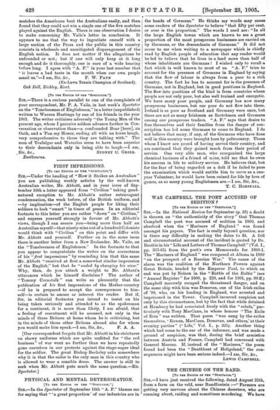[To THE EDITOR Or THE "SPECTATOR. "] SIR,—In the National Review
for September (p. 59) a doubt is thrown on " the authenticity of the story " that Thomas Campbell the poet was accused of sedition in 1800, and absolved when the " Mariners of England " was found amongst his papers. The fact is really beyond question, nor is there any difficulty in making the dates to fit. A full and circumstantial account of the incident is quoted by Dr. Beattie in his "Life and Letters of Thomas Campbell " (Vol. I., pp. 363-65) from the poet's own Memoranda. for .1800-1. The " Mariners of England" was composed at Altona in 1800 " on the prospect of a Russian War." The cause of the alarm was the coalition of the Northern Powers against Great Britain, headed by the Emperor Paul, to which an end was put by Nelson in the "Battle of the Baltic" (see "Annual Register" for 1800, p. 220, and for 1801, pp. 98 ff.) Campbell narrowly escaped the threatened danger, and on the same ship with him was Donovan, one of the Irish exiles of '98, who, on his landing in England, was arrested and imprisoned in the Tower. Campbell incurred suspicion not only by this circumstance, but by the fact that while detained at Hamburg he bad associated freely with the " rebels," par- ticularly with Tony MacCann, in whose honour " The Exile of Erin" was written. That poem "was sung by the exiles themselves, Rowan, MacCann, Donovan, and others,' at their evening parties " (" Life," Vol. I., p. 325). Another thing which had come to the ear of the informer, and was made a ground of suspicion, was that, during the brief armistice between Austria and France, Campbell had conversed with General Moreau. If, instead of the " Mariners," the poem found had been the " Deathboat of Heligoland," the con- sequences might have been serious indeed.—I am, Sir, &c.,
LEWIS CAMPBELL.










































 Previous page
Previous page